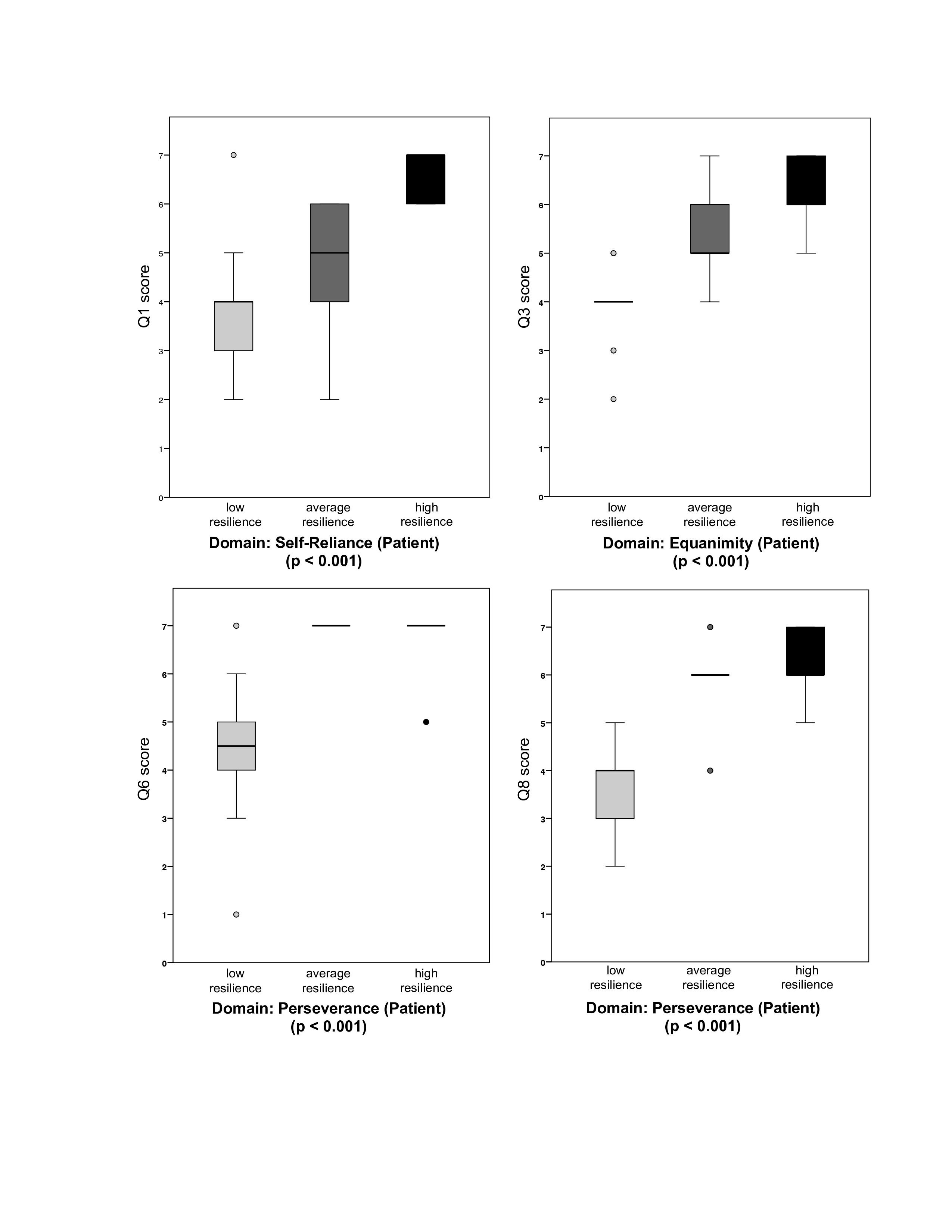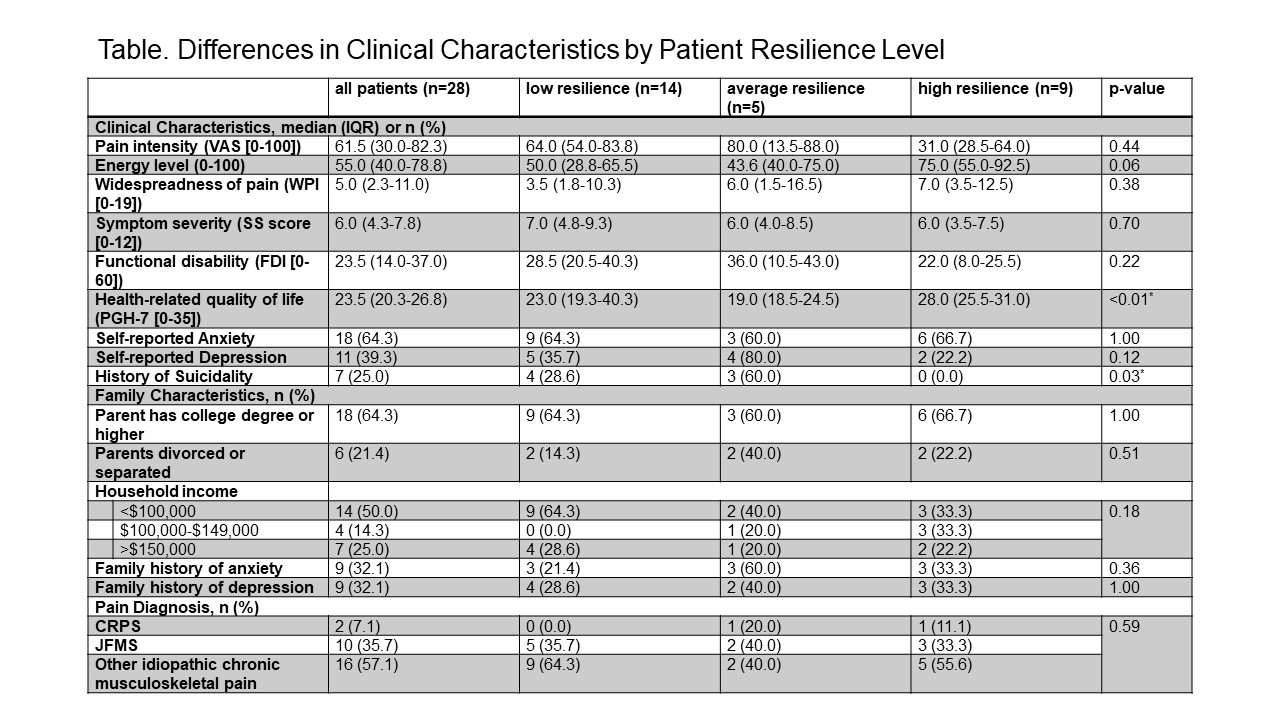Session Information
Session Type: Poster Session B
Session Time: 9:00AM-11:00AM
Background/Purpose: Adolescents with chronic musculoskeletal pain (CMP) and their parents have been found to have low to moderate levels of resilience and resilience levels are associated with symptom severity. However, the causal role of resilience in CMP has not yet been established. We aimed to identify resilience domains that differ among youth with high versus low levels of resilience, as well as their parents, in order to elucidate salient resilience domains relevant to symptom severity in adolescent CMP.
Methods: This was a cross-sectional study of patients aged 13-17 years diagnosed with CMP, and one of their parents, seen in a pediatric Rheumatology subspecialty pain clinic for an initial consultation between March and May 2018. A series of online questionnaires, including the Resilience Scale 14-item (RS-14), were administered to the patient-parent pairs within 12 weeks of the initial clinic visit. Questionnaires were complemented by data abstraction from the electronic medical record. The RS-14 was re-categorized into three resilience levels: low (14-73), average (74-81), and high (82-98). Scores on each question of the RS-14 were summarized for each resilience level (low, average, and high). Differences in question scores and variables of interest between resilience groups were assessed with Kruskal-Wallis tests and Freeman Halton Fischer’s exact tests, as appropriate.
Results: A total of 28 patient-parent pairs were included. The majority of patients (71.4%) and parents (92.9%) were female. Patient-parent pairs were predominantly non-Hispanic whites (75.0%) with most residing in a suburban area (60.7%). The median age of parents was 48 years (IQR 45-51) and the median age of patients was 15 years (IQR 14-16). Half of the patients had low resilience (n=14) and a little more than half (53%) of parents had high resilience (n=15). The questions with the most significant differences (p < 0.001) between resilience groups for patients were within the domains of equanimity, perseverance, and self-reliance (Figure 1). The questions with the most significant differences (p < 0.001) between resilience groups for parents were within the domains of existential aloneness, meaningfulness, perseverance, and self-reliance (Figure 2). Overall health-related quality of life (HRQoL) as defined by the PROMIS Pediatric Global Health 7 (PGH-7) score varied significantly across resilience levels for patients (p < 0.01) as did a history of suicidality (p = 0.03) (Table).
Conclusion: Domains of resilience most prominent among both youth with CMP and their parents included self-reliance and perseverance. Differences in patient-level resilience were associated with overall HRQoL and a history of suicidality. These findings lay the groundwork for future mixed methods research to better characterize and target these salient domains of resilience as they relate to adolescent CMP and guide novel treatment interventions.
 Figure 1. Box-plots of Scores in Salient Domains Identified on the RS-14 Stratified Across Levels of Resilience Among Patients. Legend. Patients with high resilience scored highest on RS-14 questions representing the salient domains of self-reliance, equanimity, and perseverance when compared to patients with low and average resilience.
Figure 1. Box-plots of Scores in Salient Domains Identified on the RS-14 Stratified Across Levels of Resilience Among Patients. Legend. Patients with high resilience scored highest on RS-14 questions representing the salient domains of self-reliance, equanimity, and perseverance when compared to patients with low and average resilience.
 Figure 2. Box-plots of Scores in Salient Domains Identified on the RS-14 Stratified Across Levels of Resilience Among Parents. Legend. Parents with high resilience scored highest on RS-14 questions representing the salient domains of perseverance, existential loneliness, meaningfulness, and self-reliance when compared to parents with low and average resilience.
Figure 2. Box-plots of Scores in Salient Domains Identified on the RS-14 Stratified Across Levels of Resilience Among Parents. Legend. Parents with high resilience scored highest on RS-14 questions representing the salient domains of perseverance, existential loneliness, meaningfulness, and self-reliance when compared to parents with low and average resilience.
 *Statistically significant difference between groups, p < 0.05; VAS = visual analog scale, rating of level of pain (0-100); WPI = widespread pain index (0-19), measure of widespreadness of pain; SS score = Symptom severity score (0-12), measure of condition severity; WPI and SS score defined according to the 2010 College of Rheumatology Criteria for Fibromyalgia Syndrome; FDI = functional disability inventory, measure of disability (0-60) with higher scores indicating greater pain-related functional disability; PGH-7 = Patient Reported Outcomes Measurement Information System (PROMIS) Pediatric Global Health Measure, measure of health related quality of life (HRQoL) (0-35), with higher scores indicating better HRQoL; CRPS = complex regional pain syndrome; JFMS = juvenile fibromyalgia syndrome
*Statistically significant difference between groups, p < 0.05; VAS = visual analog scale, rating of level of pain (0-100); WPI = widespread pain index (0-19), measure of widespreadness of pain; SS score = Symptom severity score (0-12), measure of condition severity; WPI and SS score defined according to the 2010 College of Rheumatology Criteria for Fibromyalgia Syndrome; FDI = functional disability inventory, measure of disability (0-60) with higher scores indicating greater pain-related functional disability; PGH-7 = Patient Reported Outcomes Measurement Information System (PROMIS) Pediatric Global Health Measure, measure of health related quality of life (HRQoL) (0-35), with higher scores indicating better HRQoL; CRPS = complex regional pain syndrome; JFMS = juvenile fibromyalgia syndrome
To cite this abstract in AMA style:
Pianucci L, Sonagra M, Stryker D, Gmuca S. Identification of Salient Resilience Domains Among Adolescents with Chronic Musculoskeletal Pain and Their Parents [abstract]. Arthritis Rheumatol. 2020; 72 (suppl 10). https://acrabstracts.org/abstract/identification-of-salient-resilience-domains-among-adolescents-with-chronic-musculoskeletal-pain-and-their-parents/. Accessed .« Back to ACR Convergence 2020
ACR Meeting Abstracts - https://acrabstracts.org/abstract/identification-of-salient-resilience-domains-among-adolescents-with-chronic-musculoskeletal-pain-and-their-parents/
